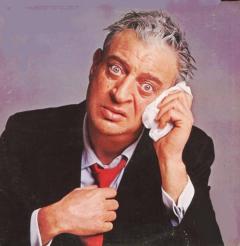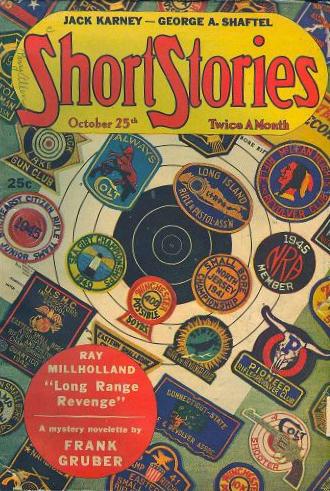Saturday, June 7: Mississippi Mud
LONG STORY SHORT
by John M. Floyd
 I’ve often heard writers of nonfiction complain that they’re the Rodney Dangerfields of the literary community. Not that they don’t sell a lot of books and articles (because they do) or that they don’t make money from their writing (because they do). Their complaint is that they sometimes feel they aren’t recognized as “real” writers until they’ve published fiction.
I’ve often heard writers of nonfiction complain that they’re the Rodney Dangerfields of the literary community. Not that they don’t sell a lot of books and articles (because they do) or that they don’t make money from their writing (because they do). Their complaint is that they sometimes feel they aren’t recognized as “real” writers until they’ve published fiction.
The same might be said of short-story writers. Some feel they aren’t truly fiction writers unless and until they’ve sold a novel. Is that fair? I of course don’t think so, though I’m a little biased. But many people who are not writers have asked me, point-blank, “Why waste your time writing short stories when you could be writing novels?”
Well, I’ve written three novels, and most of a fourth, but they’re sitting here at home aging like tobacco leaves, or (as I prefer to think) fine wine. I realize I should be aggressively marketing them, and plan to get started on that this year, but up until now I’ve concentrated on short fiction. One of the reasons, honestly, is that I think it’s more fun. Another is that since I’ve sold a boatload of short stories and have never sold a novel, I just feel more comfortable writing and marketing the short stuff. It’s safe ground for me, and I’m as reluctant as the next soldier to venture far from my foxhole unless someone orders me to.
Does that mean I’m not a real fiction writer? Maybe so — that question would have to be answered by my readers. But it’s not a question that bothers me much, and I would advise my nonfiction writer friends to take that same attitude. (By the way, my personal take on nonfiction is that it’s harder to write than fiction, and requires at least as much talent.)
Having said all that, what possible advantage could there be to writing short stories instead of novels? (Besides the security of my comfort zone, I mean.) After all, novels are the shining stars of the literary sky, and are probably the only way an author of fiction can ever hope to squint in the glare of the limelight.
So why write short fiction? Glad you asked. Here are a few advantages of short stories over novels:
 (1) They can be resold. And not just once. I’ve sold some of my short stories five and six times each, to different markets. All that’s required is that you not sign away “all rights” to your piece; that way, you can sell reprint rights over and over again.
(1) They can be resold. And not just once. I’ve sold some of my short stories five and six times each, to different markets. All that’s required is that you not sign away “all rights” to your piece; that way, you can sell reprint rights over and over again.
(2) They give you a sense of completion. Finishing a story and writing THE END is a great feeling, to me — and with short stories, it happens often. I can write one in a matter of hours or days, and turn around and write something else, something completely different, as soon as I’m done.
(3) There’s less time invested. This ties in with the previous item. A novel takes months or even years to write, and if it doesn’t sell, you’ve spent an enormous chunk of time in the company of those characters and inside that plot. (Forgive me if that’s a negative outlook.)
(4) They can help you build a résumé. Credits obtained by publishing stories in quality magazines and anthologies can make you more marketable as a writer, not only to other magazines but to agents and publishers of longer works.
(5) They’re good practice. Crafting publishable short stories teaches you a lot about how to write “tight.” Novels might be long, but the best novels are still written in a way that is focused and compact, with few wasted words. Writing short also gives you good experience in creating the story arc that is so necessary in novels, plays, screenplays, etc.
(6) You don’t need an agent. Many aspiring novelists are advised to try to find an agent before doing anything else, but this is not true of short-story writers. I had a wonderful agent for several years who represented my short fiction (he passed away in 1999), but these days few agents will take on short-story authors, and the truth is, you can probably do as well without them.
(7) It’s fun. I think the process of putting together a good plot and believable characters in only a few thousand words is a thrill as well as a challenge. If I knew I would never publish another word, I’d still write the short stuff. It’s addictive.
A final note. Even though I’ve tried to make a case for choosing to write short over long, there is one often-overlooked reason that more writers don’t write short: Some don’t feel that they can. Several of my novelist friends (one of them a New York Times bestseller) have told me they think short stories are harder to write than novels, and JLW mentioned in his column last Monday that he’d also heard that comment from other writers. Lawrence Block once agreed, saying: “Novels aren’t harder; they’re just longer.” And Faulkner said he tried writing short stories when he found he couldn’t write poetry, and then turned to writing novels when he found he couldn’t write short stories.
I’ve also heard that writing a good novel requires a better storyteller, while writing a good short story requires a better craftsman. Is that true? Who knows.
I’m not sure it matters anyway. There’ll always be room for both.




















And thank you for that.
I’m going to print that out and staple a copy to the forehead of every one who says or implies (even if not in speech, but in body language or that dance that bees do) that I ‘really should be working on The Novel’.
Including me.
It’s very difficult, even if you’ve published a few little stories, to ignore that whining lttle interior voice that says,’ you know, you really should be working …’ patati, patata.
I’ve tried to shut it up by locking it in a cellar full of rats in the back of my brain, but even through three iches of oak … yes, there it is again.
I haven’t met many other crimystery writers. I haven’t met any other crimystery writers, to talk about this with, so it’s gratifying, even at a distance, to have someone else confirm that the short story is not a rehearsal for The Novel, but that it’s an end and an art in itself and a damn exciting and rewarding one it is too, by gum.
So if my half-written nvel doesn’t get fully-written, so what?
Who’ll read it, anyway? It will almost certainly surface without trace in the annual tidal-wave of crime and mystery.
I think, au fond, that I’m a short-haul merchant, and quite glad o be so.
But that’s enough from me, I must stop, I should be working on the, erm…..
I’m in complete agreement with John on this one. I’ve published lots of short fiction and written four unpublished novels myself. For many years, I focused only on novels and stopped writing short fiction altogether. My rationale? You couldn’t make money writing short stories. Novelists make the cash, not short story writers.
You could say that philosophy backfired. While you’re writing and marketing novels, keep writing short fiction. In addition to the excellent reasons John has listed above, they also keep your name in front of a reading public while you toil away in relative anonymity creating projects that will take a year or more to write and another year to hit bookstores. Short fiction is a good business decision.
Thanks, John!
Dave Duggins
http://www.write-your-short-story.com
Neil and Dave — Thanks for your kind words, and observations. I continue to believe, or at least hope, that the short story form is gaining some rekindled interest, especially since several mystery authors like Lehane and Deaver and Leonard and Block and James Lee Burke (and Ed McBain, posthumously) have come out with fairly recent collections. I’m even planning a column on that subject, in a week or two.
I’m sure there’ll never again be anything like the Golden Age of the Short Story that existed fifty or sixty years ago, but at least maybe shorts are becoming more appreciated. I simply love ’em.
Bravo, John! Maybe a short-story resurgence will come online. (Maybe not!) But we readers & writers will have fun anyway!
I’d add that word limits fosters discipline. They help foster better writing habits such as cutting out the fat.
Excellent, John. I’ve been writing short stories since 1979 and enjoy the things you pointed out such as quick changover to the next story. The nonfiction books I have written soon become tedious. Short stories do not. In my newspaper days I learned it is more difficult to write short than long.
This is an important column.
I’ve had two novels published. I have finished a third. And I’m thinking about a fourth. And I have a few that will never see the light of day. But I LOVE writing short stories. I mean love. And some of my stories have taken many weeks/months to write. So short — time spent –means litttle to me as writer.
Neil’s reply to your column touched me. He is right. The short story is an art form unto itself. Write them proudly.